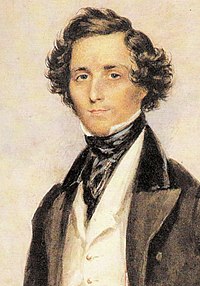| Die erste Walpurgisnacht | |
|---|---|
| Cantata by Felix Mendelssohn | |
 The composer in 1829 | |
| English | The First Walpurgis Night |
| Opus | 60 |
| Text | Poem by Johann Wolfgang von Goethe |
| Language | German |
| Based on | Walpurgis Night |
| Performed | 10 January 1833: Berlin |
| Published | 1843 |
| Duration | 36 minutes |
| Movements | 10 |
| Scoring |
|
Die erste Walpurgisnacht (The First Walpurgis Night) is a poem by Johann Wolfgang von Goethe telling of efforts by Druids in the Harz Mountains to practice their pagan rituals in the face of new and dominating Christian forces.
It was set to music by the young Lutheran Felix Mendelssohn as a secular cantata (or "Sinfonie-Ballade" in the composer's correspondence) for soloists (alto, tenor, baritone, bass), chorus and orchestra. Mendelssohn completed this work in an initial version in 1831, which was first performed at his parents' home after Goethe's death the following year and then publicly on 10 January 1833 at the Sing-Akademie in Berlin with himself on the podium. A decade later he extensively revised the cantata before allowing it to be published in 1843 as a "Ballade", his Opus 60, consisting of a programmatic overture followed by nine movements and lasting about 35 minutes:
- Overture — Das schlechte Wetter; Der Übergang zum Frühling (Bad weather; Transition to Spring)
- Es lacht der Mai (May is in full bloom) — tenor; Chorus of Druids; People
- Könnt ihr so verwegen handeln? (Could you be so rash, so daring?) — alto; Old Woman; Chorus of Wives
- Wer Opfer heut zu bringen scheut (Whoever fears to sacrifice) — baritone; Priest; Chorus of Druids
- Verteilt euch, wackre Männer, hier (Divide your forces, valiant men) — Chorus of Druid Watchmen
- Diese dummen Pfaffenchristen (Christians and their priests are witless) — bass; Watchman; Chorus of Watchmen
- Kommt mit Zacken und mit Gabeln (Come with prongs and pitchforks) — Chorus of Druids; People
- So weit gebracht, dass wir bei Nacht (It's come so far that now by night) — baritone; Priest; Chorus of Druids; People
- Hilf, ach hilf mir, Kriegsgeselle (Help, oh help me, comrade) — tenor; Chorus of Christian Watchmen
- Die Flamme reinigt sich vom Rauch (The flame cleanses itself of smoke) — baritone; Priest; Chorus of Druids; People